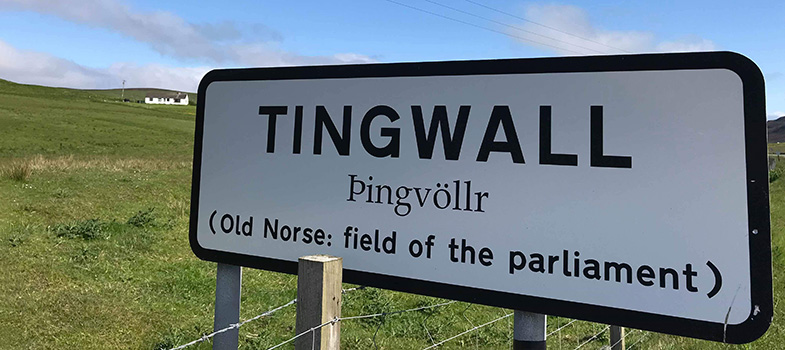5.2 Oath making and affirmation taking in Scots
Oath making and affirmation taking is conducted differently in the Scottish Parliament and the UK Parliament. At the swearing-in ceremony that takes place at the beginning of a new session of the Scottish Parliament, some MSPs choose to take their oath or solemn affirmation in Scots as well as English.
The Scots Language Centre website reports that in May 2016, ‘four members repeated their oath or solemn affirmation in the Scots dialect of Doric, and one member repeated it in general Scots’ .
Activity 5
Scottish indigenous language in the EU Parliament 
Following your consideration of the status of Welsh in the UK Government, here is another example of how recognition by political bodies helps raise the status of an indigenous language, in this case it is Scottish Gaelic.
In 2009 Scottish ministers, led by Michael Russell, won the right to speak Gaelic in the European Parliament in Brussels. This followed the EU regulation that indigenous languages should be promoted, also in political institutions. At the time Gaelic was officially recognised, the EU Parliament had acknowledged 23 languages.
Interestingly, the press reported on the fact that ‘Mr Russell is the only Scottish minister to have a smattering of Gaelic, while his colleagues, including Alex Salmond, do not speak the language at all’.
The article in The Telegraph, written by the Scottish political editor Simon Johnson, continues to explain that this move ‘follows a similar agreement that allows Welsh to be used in EU meetings, but five Welsh Assembly ministers, including Rhodri Morgan, the First Minister, are fluent’.
This fact sheds light on the UK Parliament’s response to the use of Welsh in the previous section by emphasising that when an indigenous language is to be used in political bodies, ideally there have to be speakers of this language in that political body.
A further twist in this story was provided by The Independent, which also reported on Scottish Gaelic becoming ‘an EU language’ in 2009. The article informs the reader that:
“the deal was sealed in a Memorandum of Understanding signed in Brussels yesterday by the UK's EU ambassador, Sir Kim Darroch, and by Donald Henderson, Scotland's EU director […]"
Sir Kim is quoted in the same article stating: "These arrangements will help to build a closer link between EU institutions and speakers of Scottish Gaelic by allowing them to raise their concerns and have them addressed directly in their native language. It also further promotes the long and rich cultural heritage of the Scottish people here in the EU."
But Ferguson, the author of the article in The Independent, reports that his newspaper contacted the Scottish Office, the Scottish Parliament and the Scotsman newspaper to see if these statements could be provided in Gaelic, only to be told that no one there could speak the language. (Ferguson, 2009)
As touched upon in the unit on ‘Dialect Diversity’ and underlined here, some Scots dialects are very bound up with regional identities (e.g. Doric, Shetlandic) such that speakers do not consider themselves speakers of ‘Scots’, but of the regional dialect, which is sometimes regarded as being a language in and of itself. This might have been one reason for the four MSPs from the North East taking their oaths in Doric.
In the past, some politicians have been more likely to view Scots as a disparate group of dialects, as opposed to a coherent national language. They are also often more likely to be supportive to a regional dialect - such as Doric.
At the 2015 swearing-in ceremony to the UK Parliament, three of Scottish MPs opted to repeat the oath in Scots. They were led by Dr Philippa Whitford MP (SNP) who became the first ever MP to take an oath at Westminster in Scots. She was followed by Marion Fellows MP (SNP) and Richard Arkless MP (SNP). In 2017, Dr Philippa Whitford MP (SNP) and Marion Fellows MP (SNP) again repeated their oath in Scots. Chris Law MP (SNP) and Peter Grant MP (SNP) also repeated their oath in Scots, whilst Kirsty Blackman MP (SNP) did so in Doric.
Activity 6
You will now listen to a third example of a Scottish Member of Parliament taking an oath in the Scots language:
- Listen to Dr Peter Grant MP (SNP) take his oath in Scots by selecting the period from 18:57:29 to 18:58:38.
- We have provided a transcript of Michael Russell, Peter Chapman and Peter Grant’s oaths in Scots. Read the transcriptions below and identify differences in the use of the Scots language. Do consult the DSL for this activity. Where do you see the main differences?
“…Michael William Russell swear by aal michty God that Ah will be leel an true tae Her Majesty Queen Elizabeth, her airs an successors age to the law, sae help me God…”
“I Peter Chapman, depone at Ah will be leel an haad aafil allegiance tae Her Majesty Queen Elizabeth, her airs an ony fa come efter her, sae help me God.”
“Ah swear bi aal michty God that Ah will aye howl a richt leel un faithfu hert tae Her Majesty Queen Elspeth an her line o airs, anent the law, micht God be ma health an state.” (Peter Grant)
5.1 How Scots is used in politics
